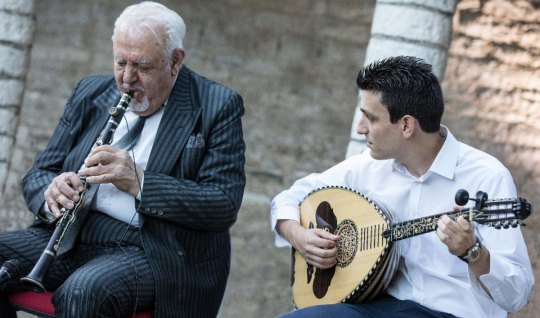|
The mention of the music of Epirus, a region of south-eastern Europe now divided between north-east Greece and southern Albania, evokes the sound of a sobbing, down-bending clarinet, on the slow tunes like Escherís ever-descending staircase.
But itís not necessarily sad music, and much on this album by the 85-year-old clarinet master Petroloukas Halkias and Vasilis Kostas, 29-year-old master of the laouto (lute with eight steel strings), is joyful and skittering, while in the atmospheric closing piece, "Mariola," they accompany, with slithering dark, breathy, clarinet and pulsing laouto drone, the lamenting vocal of guest Kostas Tzimas. There are also guest contributions from percussionist Andreas Papas on defi and darbuka, Thanasis Vollas on laouto and, on clarinet, Petroloukasís grandson Petros. Eight of the nine tracks are derived from traditional song melodies, while one is a tribute by Vasilis to his first music teacher, Epirus clarinettist Andreas Fakos.
Petroloukas and Vasilis are both from the Pogoni region of Epirus, Greece, but first met in Boston in 2015, where Vasilis had studied at Berklee.
Petroloukasís approach to clarinet is in the style pioneered between 1920 and 1930 by clarinettist Kitsos Harisiadis. Even before they met, Petroloukasís style and phrasing was an influence on Vasilisís laouto playing, so their coming together was very natural.
The Berklee connection might suggest Vasilis has involvements in jazz, and so he has, among others as a member of the Global Messengers led by Grammy-winning pianist Danilo Perez. But while the jazz experience has enhanced his fluency and intuitive ability, whatís on this CD is a fine, responsive dialogue in deeply Epirus music. As Petroloukas puts it ďWe did not Ďdemolish the pillars of the Parthenoní; we just enhanced whatever was handed to us, so that the next generation will create something even betterĒ.
Thatís very modest; this is beautiful, exciting, heart-felt music by two brilliant players, master exponents of one of Europeís most distinctive and valuable musical traditions. - Andrew Cronshaw
Further reading and listening:
Iíd recommend seeking out the recordings of the aforementioned Kitsos Harisiadis; as I write this Iím listening, after the nine tracks of The Soul Of Epirus have finished, to 1928-29 recordings of his yearning, fluttering playing, sounding as fresh as a modern recording, on Music From Epirus 1926-1945 (BMG/Falirea), and he also appears on several other CD releases of Epirus music - AC
Savina Yannatou and Primavera en Salonico
Martha Mavroidi
|
